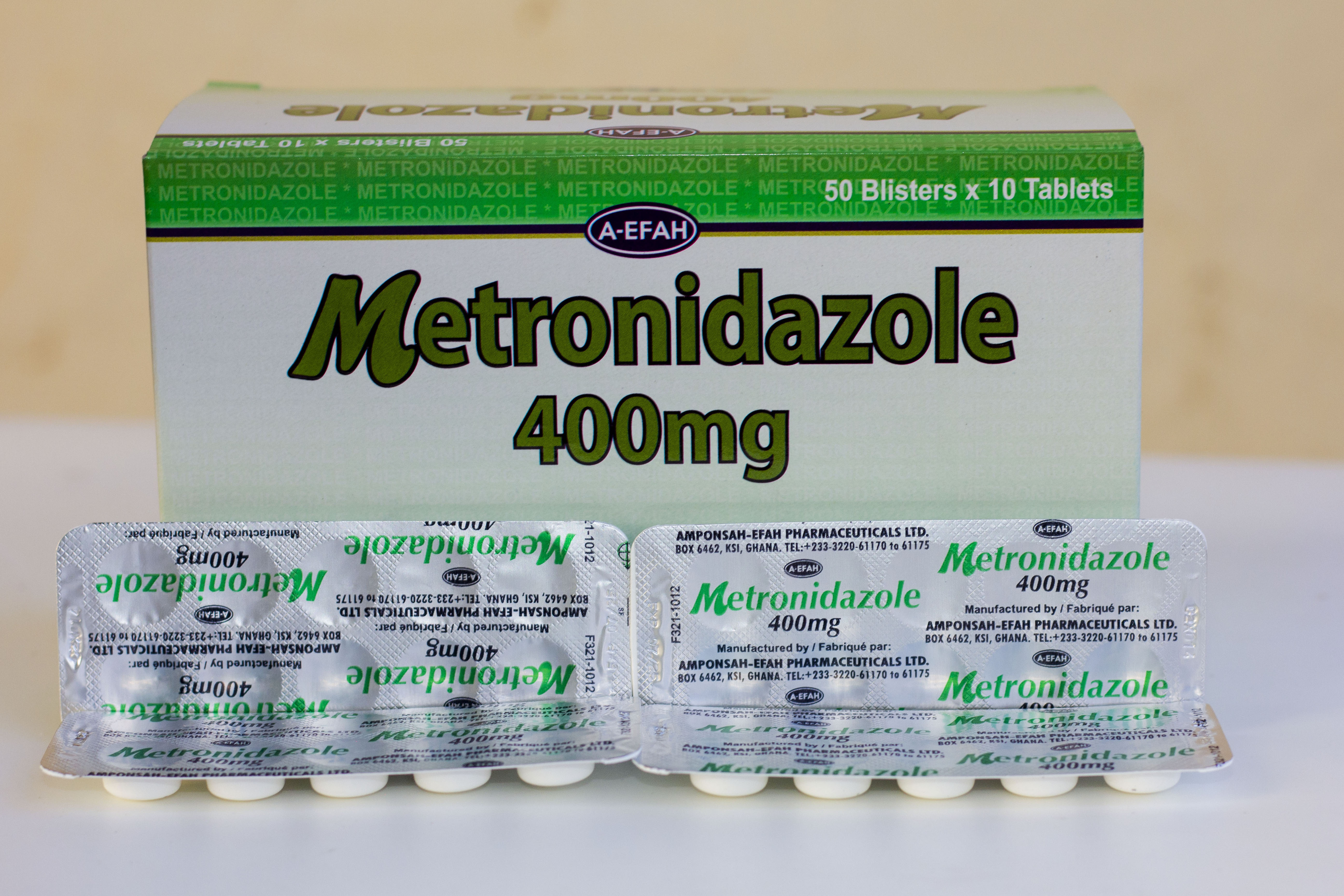
Metronidazole (400mg)
Composition
Each Metronidazole- 400 mg contains Metronidazole 400mg as active ingredients
It also contains lactose monohydrate, maize starch, povidone, and magnesium stearate as inactive ingredients.
Each Metronidazole- 200mg contains Metronidazole 200mg as active ingredients
It also contains lactose monohydrate, maize stearate, and color as inactive ingredients.
Each 5ml of metronidazole suspension contains metronidazole 200mg (as benzoate) as active ingredient. Also contains sugar, glycerin, citric acid, sodium citrate, methylparaben, propylparaben, sodium benzoate, and flavor and color as inactive ingredients.
Indications
Metronidazole is used in the treatment and prevention of anaerobic bacteria such as bacterial vaginosis, acute necrotizing ulcerative gingivitis, pelvic inflammatory disease, tetanus, antibiotic-associated colitis, and in the eradication of H-Pylori(together with other drugs). Other protozoal infections that can be treated with metronidazole include amoebiasis, giardiasis, trichomoniasis, leishmaniasis, and microsporidiosis.
Dosage Administration
Metronidazole should be only taken under the prescription of a physician.
AEROBIC INFECTIONS
Adults & children over 10 years: 400mg every 8 hours usually for 7 days(or 10 to 14 days in Clostridium difficile infections)
Children 8 weeks-10 years: 20-30 mg/kg/day as a single dose or divided into 7.5 mg/kg every 8 hours for 7 days.
Children under 8 weeks: 15 mg/kg/day as a single dose or divided into 7.5mg/kg every 12 hours.
LEG ULCERS ADN PRESSURE SORES
Adults & children over 10 years: 400 mg every 8 hours for 7 days
BACTERIA VAGINOSIS
Adults: 400mg every 12 hours for 7 days or 2g as a single dose
PELVIC INFLAMMATORY DISEASE
Adults: 400mg every 12 hours for 14 days.
ACUTE ULCERATIVE GINGIVITIS OR ACUTE ORAL INFECTIONS
Adults & children over 10 years: 200mg every 8 hours for 3 to 7 days
7 to 10 years: 100mg every 8 hours for 3 to 7 days
3 to 7 years: 100mg every 12 hours for 3 to 7 hours
1 to 3 years: 50mg every 8 hours for 3 to 7 days
SURGICAL PROPHYLAXIS
Adults & children over 10 years: 400mg 2 hours before surgery, up to 3 further doses of 400mg may be given every 8 hours for high-risk procedures
Children under 10 years: 20 to 30mg/kg as a single dose 1 to 2 hours before surgery
Newborn with a gestation less than 40 weeks: A more suitable dosage form should be used
Pharmacodynamic Properties
Metronidazole is an antimicrobial drug with high activity against several anaerobic bacteria and protozoa. The drug interferes with the DNA of susceptible organisms leading to a bacteria/ amoebicidal action
Pharmacokinetic Properties
Metronidazole is readily absorbed following oral administration and reaches peak blood levels within 2 hours of a single dose. It is excreted from the body mainly through urine
Contraindications
Patients with known hypersensitivity or allergic to metronidazole, nitronidazole, or any of the ingredients in the drug should avoid using this drug
Warnings and Precautions
Metronidazole should be administered with caution in patients with impaired liver function and hepatic encephalopathy (dose may be dose). It should be avoided in patients with acute porphyria. Clinical and laboratory monitoring is advised if treatment exceeds 10 days.
Possible side effects
The most common side effect of the metronidazole include stomach disturbances, nausea, vomiting, unpleasant metallic taste, loss of appetite, diarrhoea or constipation, furred tongue, mucositis, hepatitis, jaundice, darken urine, muscle weakness, arthralgia, visual disturbances, skin rashes, and itching.
Symptoms and Treatment of Overdose
Symptoms of overdose include feeling or being sick, loss of appetite, diarrhoea, metallic taste, headache, dizziness, insomnia or drowsiness. Consult the Physician when a dose greater than recommended is administered.
Possible Interactions with Food or Drugs
Alcohol may give a bad psychotic reaction when taken with metronidazole
Metronidazole may interact with blood thinning drugs such as warfarin, drugs for control of epilepsy such as phenytoin and primidone, barbiturates, cytotoxic ( cancer treatment drugs such as busulfan and fluorouracil), disulfiram, lithium, mycophenolate, oestrogens, cimetidine, and oral typhoid vaccines
Pregnancy and Lactation
Metronidazole should be avoided during pregnancy, especially during the first trimester. Metronidazole is distributed into breast milk giving it a bitter taste
Presentation
Metronidazole 400mg Tablet and Metronidazole 200mg Tablet are round uncoated, in blister packs of 10 x 50 tablets per pack.
Metronidazole Suspension 200mg/5ml is presented in 100ml amber bottles
Storage Condition
Metronidazole should be stored below 30 degrees Celsius and away from moisture and light. Keep out of reach of children.